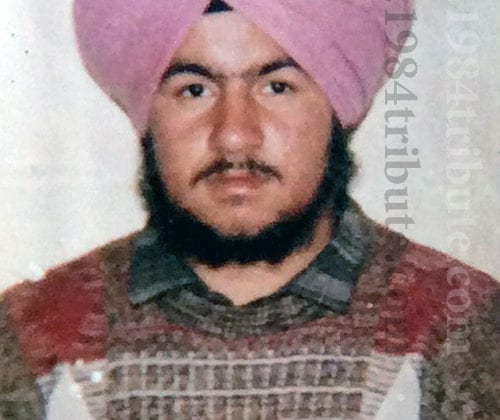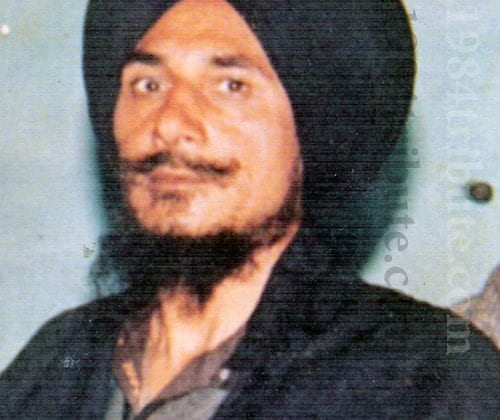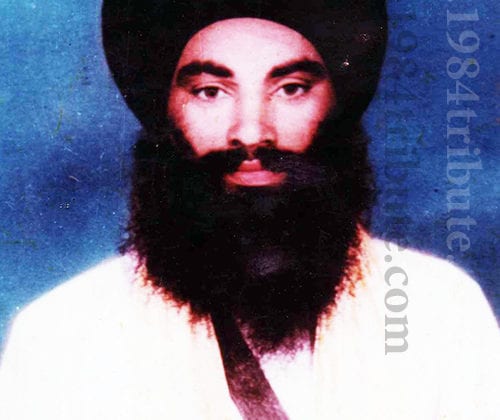Shaheed Bhai Surjeet Singh Behla
Shaheed Bhai Surjeet Singh Behla
Bhindranwale Tigers Force of Khalistan
In the Tarn Taran area, there is a village, Behla. In Behla, Sardar Arlok Singh, a farmer had two sons, Dilbagh Singh and Surjeet Singh. Because Dilbagh Singh was of a religious minded, he left his family in 1980 and began to stay with the Kar Seva Babas. His family tried to bring him back many times, but he refused outright. In the end, the family was forced to accept his decision.
The attack on the Sri Darbaar Sahib woke up the sleeping Sikh youth and the young Surjeet Singh Behla had already received the company and love of Sant Jarnail Singh jee. His whole being was shaken. His feet began to walk automatically on the path of the Sikh Struggle. First he joined Shaheed Bhai Gurdev Singh Osmanwala and Badala’s group and then later he joined with Baba Gurbachan Singh Manochahal. After some time, someone informed the police and Surjeet Singh was arrested. Surjeet Singh was taken to Maal Mandi and the Tarn Taran CIA Staff, where he was inhumanly tortured by Sita Ram. The police weren’t able to get any information from Surjeet Singh nor could they change his firm mind (to turn away from the freedom struggle). When the second attack on Darbar Sahib took place (Black Thunder), Surjeet Singh was in jail.
After being released from jail, Surjeet Singh resumed his militant activities and on many occasions, despite being surrounded, he ran firing out of the police cordons. Surjeet Singh became a “Class A” militant. He was now the Lieutenant of the Bhindranwale Tiger Force under the leadership of Baba Gurbachan Singh Manochahal, and was most close to Baba Manochahal. In the 1991 elections, the Baba Manochahal group made the farsighted decision to support the Sikh Student Federation group and participate in the elections. But this decision was opposed by some militant groups. They did not understand the earlier Government strategy of cancelling the elections and decided to boycott the elections, which proved to be a suicidal decision. After the Beant government came to power, the genocide which took place in the villages left international human rights organizations horrified, but these atrocities did not affect the militants’ determination and faith even in the slightest.
In these days, Surjeet Singh made a secret bunker in an empty building in his village, and lived there with one companion. The mason who helped construct this bunker informed the police and the Tarn Taran SSP Ajit Sandhu, SP Operations, Khubi Ram, DSP Gurjeet and other well known police officers led a group of soldiers and police to the bunker. This was June 7, 1992. The Police believed that this hidden bunker only had weapons and not Behla himself. But Behla and the other Singh were present in the bunker along with another Singh who supplied them food. The terrified police officers took the Village Head and other innocent villagers as shields and entered the building to search it. The mason began to break the bunker and Behla and his companions heard this and understood what was going on. These beloveds of the Guru performed an ardas in their mind and decided to become martyrs. They took their weapons and opened the inner door of the bunker. When they stepped out, they immediately let out a burst and the searching army/police team ran away. The Officers went on the highest roof of the building and once the encounter began, were stranded there. After the Police had run away, Behla and his companions searched the ground floor of the building, where they found the Village Head. Behla was shocked to find him here and asked why he had come. The Head and others explained how the police had brought them as shields. Behla told them he would give them cover fire and help them escape the building. Before helping the Village Head leave, he gave him a final letter for his family which had three main messages:
1) Tell my father not to leave Behla village
2) Tell my wife to obey my mother and father.
3) At a certain place, I have put Rs. 20 000 and tell my father to take that money and
arrange Akhand Paaths for us.
After giving this message, Surjeet Singh gave the innocent villagers cover-fire and sent them out. Taking inspiration from them the Chamkaur Sahib battle, a unique type of a fight began. At the start of the encounter, the Punjab Police and the “brave” soldiers of the Indian army took innocent villagers as human shields and fired a shower of bullets towards the building. The villagers still become emotional when they tell how the security forces made the villagers stand around the building and the police fired between their legs. They also tell us how Behla in a thundering voice was yelling Jaikaras and also curses, saying “Fight us straight! Why are you putting innocent people in front of you?” But these insults could not make the “brave” Indian soldiers nor do the Punjab Police feel any shame. The villagers smile and tell us how Behla’s bullets avoided the villagers but kept hitting the police officers. The army and police brought bullet proof tractors, armoured cars and mortar guns, but the two hungry and tired Singhs fought this amazing force for 36 hours, and were finally martyred. That building which held the bunker is still standing today in ruins as a witness to the heaving fire and bombing that took place.
When the Security Forces saw that only two Singhs had fought them, they took 6 innocent villagers who had been wounded and killed them and told the press that 9 militants had been killed. Because of the slaughter of these innocents, the police was heavily criticized and the bravery of Surjeet Singh Behla was discussed in every village of Punjab. Baba Gurbachan Singh Manochahal heard about Bhai Behla’s martyrdom and said “Today my right arm has been broken.” He wrote an emotional poem on the martyrdom of Bhai Behla, and when reciting it, he would begin to cry. Perhaps today no one speaks about the martyrdom of these Singhs openly, due to fear, but that time will come when ballads of their bravery will again be openly sung on stages.
Information given by the family of Shaheed Bhai Surjeet Singh Behla






